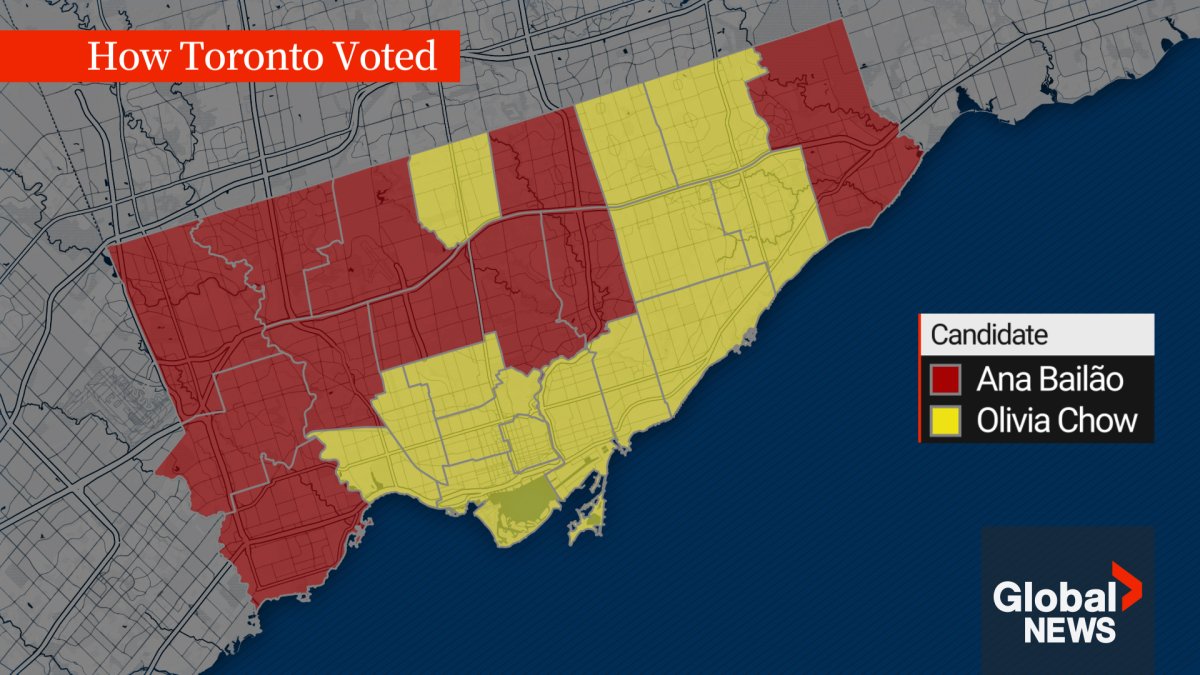As Toronto awakens to a new mayor-elect in town, here’s a look at the unofficial results from Monday night of how Torontonians voted across different parts of the city.

Olivia Chow, who won the tight mayoral race, received around 37 per cent of the vote, with former city councillor Ana Bailao in second place with just over 32 per cent of the vote. Former Toronto police chief Mark Saunders came in a distant third with about 8.5 per cent of the vote.
In total, according to the unofficial results as they played out on election night, Chow collected 269,372 votes from Torontonians, Bailao received 235,175 votes and Saunders got 62,167.
Rounding out the top five in an election that saw a staggering 102 candidates, a record since Toronto’s amalgamation, were right-wing columnist Anthony Furey in fourth place and city councillor Josh Matlow in fifth.
Breaking it down by the city’s 25 wards, Chow swept the downtown core but also made strides in Scarborough, coming out on top in five of the six wards.
For Scarborough North, the unofficial results indicated she almost doubled the number of votes of Bailao at 8,940 vs. 4,482. Scarborough Centre, Scarborough Southwest and Scarborough-Guildwood saw a much closer race, with the two separated by just a few hundred votes and Chow coming out on top.
In Scarborough-Agincourt, Chow had a wider lead on Bailao with a difference of almost 2,500 votes.
But Scarborough-Rouge Park in the city’s far east quadrant saw Bailao edge out Chow by just 32 votes.
In the downtown core, Chow received the majority of votes in wards like Spadina-Fort York, Toronto Centre, University-Rosedale, Toronto-Danforth, Parkdale-High Park and others.
Chow also received almost 7,000 more votes than Bailao in the Davenport ward — a ward that Bailao represented for several years while she was a city councillor.
Meanwhile, in Etobicoke, Bailao gained more votes than Chow in all three wards.
The tightest race by far was Humber River-Black Creek, which showed only a two-vote difference between Bailao and Chow, at 4,487 votes and 4,485 votes, respectively.
The majority of votes in North York wards went to Bailao, although the Don Valley wards were much closer.
Monday night’s byelection was triggered in February after former mayor John Tory admitted to having an inappropriate relationship with a member of his staff and then resigned from his role. Deputy Mayor Jennifer McKelvie has led the city during the last few months.
Chow was a Toronto city councillor herself for more than a decade starting in the ’90s and then became an NDP parliamentarian in the House of Commons in the mid-2000s.
She first ran for mayor in 2014 but came in third place, having been defeated by Tory and now-Premier Doug Ford.
According to a statement from the city on Tuesday, the city clerk is expected to certify the official results of Monday’s mayoral byelection by Wednesday, June 28.
Chow has requested to take office two weeks later on Wednesday, July 12, after making the Declaration of Office with the city clerk, officials also said.






Comments